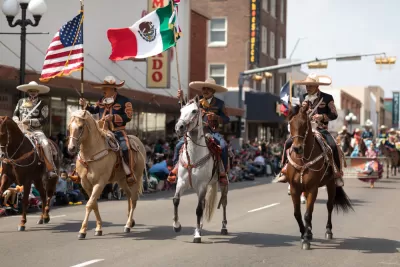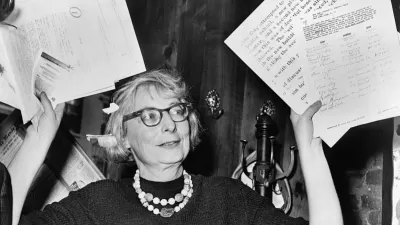In a year-long program that included bike rides, serenades, and Dragtivist performances, an art collective guided Brownsville, Texas residents in reimagining how they could influence equity and justice in their city.

One of the poorest cities in the country is in South Texas, adjacent to the Mexico border. In Brownsville, the average annual household income is $15,030, according to the American Community Survey 5-Year Estimates from 2013-2015. The Rio Grande Valley region, however, is rich with the cultural history of immigrants. More than 90 percent of households identify as Hispanic or Latinx, and many families are mixed status, meaning one or more family members are undocumented.
Finding affordable housing is difficult in Brownsville. The occupancy rate for affordable housing is near 99 percent (the ideal rate for a city of comparable size is 95 percent), and since last year, the public housing program has been at capacity, with an average wait time of 2 to 4 years. With efforts underway to revitalize the downtown area, and new industries like SpaceX making the region their home, it could become even more difficult to find affordable housing in the city. All the changes make it clear that it is extremely important for Brownsville residents and civic leaders to take a hard look at what equity in the city would and could look like.
At Las Imaginistas, a socially engaged art collective working along the U.S./Mexico border, we focus on a variety of community development issues including development of microeconomies and the inclusion of community voice in regional planning processes. As recipients of a national socially engaged art fellowship called A Blade of Grass, Las Imaginistas worked on a 12-month community engagement program in Brownsville called Hacemos La Ciudad (We Make the City).
This is what we did ...
FULL STORY: A Radically Different Planning Process in Brownsville

Alabama: Trump Terminates Settlements for Black Communities Harmed By Raw Sewage
Trump deemed the landmark civil rights agreement “illegal DEI and environmental justice policy.”

Study: Maui’s Plan to Convert Vacation Rentals to Long-Term Housing Could Cause Nearly $1 Billion Economic Loss
The plan would reduce visitor accommodation by 25% resulting in 1,900 jobs lost.

Planetizen Federal Action Tracker
A weekly monitor of how Trump’s orders and actions are impacting planners and planning in America.

Wind Energy on the Rise Despite Federal Policy Reversal
The Trump administration is revoking federal support for renewable energy, but demand for new projects continues unabated.

Passengers Flock to Caltrain After Electrification
The new electric trains are running faster and more reliably, leading to strong ridership growth on the Bay Area rail system.

Texas Churches Rally Behind ‘Yes in God’s Back Yard’ Legislation
Religious leaders want the state to reduce zoning regulations to streamline leasing church-owned land to housing developers.
Urban Design for Planners 1: Software Tools
This six-course series explores essential urban design concepts using open source software and equips planners with the tools they need to participate fully in the urban design process.
Planning for Universal Design
Learn the tools for implementing Universal Design in planning regulations.
Caltrans
Smith Gee Studio
Institute for Housing and Urban Development Studies (IHS)
City of Grandview
Harvard GSD Executive Education
Toledo-Lucas County Plan Commissions
Salt Lake City
NYU Wagner Graduate School of Public Service



























